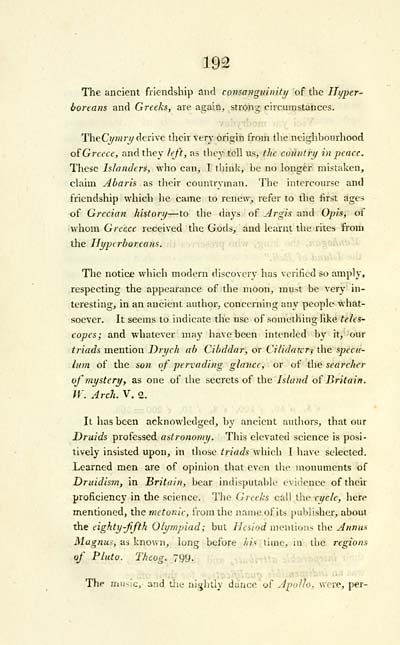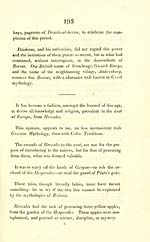Blair Collection > Celtic researches, on the origin, traditions & language, of the ancient Britons
(282)
Download files
Complete book:
Individual page:
Thumbnail gallery: Grid view | List view

192
The ancient friendship and covsaiiguinifi/ of the Hyper-
boreans and Greeks, are again, strong circumstances.
The Cyw 77/ derive their very origin from the neighbourhood
ΟΪ Greece, and they left, as they tell us, the coi'nttri/ in peace.
These Islanders, who can, ΐ think, be no longer mistaken,
claim Abaris as their counlryman. The intercourse and
friendship which he came to renew, refer to the tìrst ages
of Grecian history— to the days of Argis and Opis, of
Avhom Greece received the Gods, and learnt the rites from
the Hyperboreans.
The notice \vhich modern discovery has verified so amply,
respecting the appearance of the moon, must be very in-
teresting, in an ancient author, concerning any people what-
soever. It seems to indicate the use of something like teles-
copes; and whatever may have been intended by it, our
triads mention Drych ab Cibddar, or Cilidazcr^ the specu-
lum of the son of pervading glance, or of the searcher
of mystery, as one of the secrets of the Island οΐ Britain.
W. Arch. V. 2.
It has been acknowledged, by ancient authors, that our
Druids professed astronomy. This elevated science is posi-
tively insisted upon, in those triads which I iiave selected.
Learned men are of opinion that even the monuments of
Druidism, in Britain, bear indisputable evidence of their
proficiency in the science. The Greeks call ú\c ci/cle, here
mentioned, the mctoiiic, from the name of its publisher, about
the eighty-fifth Olympiad; but Hesiod nicuúon^ the Annus
Magnui, as known, long before his lime, in llie regions
of Pluto. Theog. 799.
The r/iu-ic, and tlie nightly dance of Apollo, were, per-
The ancient friendship and covsaiiguinifi/ of the Hyper-
boreans and Greeks, are again, strong circumstances.
The Cyw 77/ derive their very origin from the neighbourhood
ΟΪ Greece, and they left, as they tell us, the coi'nttri/ in peace.
These Islanders, who can, ΐ think, be no longer mistaken,
claim Abaris as their counlryman. The intercourse and
friendship which he came to renew, refer to the tìrst ages
of Grecian history— to the days of Argis and Opis, of
Avhom Greece received the Gods, and learnt the rites from
the Hyperboreans.
The notice \vhich modern discovery has verified so amply,
respecting the appearance of the moon, must be very in-
teresting, in an ancient author, concerning any people what-
soever. It seems to indicate the use of something like teles-
copes; and whatever may have been intended by it, our
triads mention Drych ab Cibddar, or Cilidazcr^ the specu-
lum of the son of pervading glance, or of the searcher
of mystery, as one of the secrets of the Island οΐ Britain.
W. Arch. V. 2.
It has been acknowledged, by ancient authors, that our
Druids professed astronomy. This elevated science is posi-
tively insisted upon, in those triads which I iiave selected.
Learned men are of opinion that even the monuments of
Druidism, in Britain, bear indisputable evidence of their
proficiency in the science. The Greeks call ú\c ci/cle, here
mentioned, the mctoiiic, from the name of its publisher, about
the eighty-fifth Olympiad; but Hesiod nicuúon^ the Annus
Magnui, as known, long before his lime, in llie regions
of Pluto. Theog. 799.
The r/iu-ic, and tlie nightly dance of Apollo, were, per-
Set display mode to: Large image | Transcription
Images and transcriptions on this page, including medium image downloads, may be used under the Creative Commons Attribution 4.0 International Licence unless otherwise stated. ![]()
| Early Gaelic Book Collections > Blair Collection > Celtic researches, on the origin, traditions & language, of the ancient Britons > (282) |
|---|
| Permanent URL | https://digital.nls.uk/75766997 |
|---|
| Description | A selection of books from a collection of more than 500 titles, mostly on religious and literary topics. Also includes some material dealing with other Celtic languages and societies. Collection created towards the end of the 19th century by Lady Evelyn Stewart Murray. |
|---|
| Description | Selected items from five 'Special and Named Printed Collections'. Includes books in Gaelic and other Celtic languages, works about the Gaels, their languages, literature, culture and history. |
|---|

